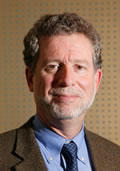Arthur Schatzkin Remembrance
In Remembrance of Arthur Schatzkin, M.D., Dr.P.H., 1948 - 2011
Dr. Arthur Schatzkin, an outstanding scientist, mentor, and leader in the field of nutritional epidemiology, passed away on January 20, 2011 from cancer. An internationally renowned pioneer in the field of nutrition and cancer and a gifted public speaker, he was a man of great personal and professional integrity who cared deeply about the impact of his work on public health.
Dr. Schatzkin received a B.A. from Yale University, an M.D. from the State University of New York, and an M.P.H. and Dr.P.H. from Columbia University. He came to NCI in 1984, and in 1999 was appointed as the Chief of the Nutritional Epidemiology Branch (NEB) in the Division of Cancer Epidemiology and Genetics (DCEG).
Dr. Schatzkin was committed to understanding the role of nutrition in cancer etiology and prevention. Early in his career, he was the first to describe an association between moderate alcohol intake and breast cancer risk. He then turned his attention to the role of diet in the prevention of colorectal cancer. He led the landmark NCI Polyp Prevention Trial, which determined that eating fiber did not prevent the recurrence of polyps in the colon.
Dr. Schatzkin was instrumental in addressing the major methodological issues that have limited progress in nutritional epidemiology. As an example, to overcome the limited range of reported dietary intake in cohort studies, he conceived and launched the NIH-AARP Diet and Health Study, which at the time was the largest prospective cohort investigation of diet and nutrition in relation to cancer causation. This long-term study of approximately 500,000 men and women already has generated more than 100 original scientific papers and continues to be an invaluable resource utilized by investigators worldwide.
Dr. Schatzkin was dedicated to the pursuit of strategies in nutritional epidemiology and to the training, mentoring, and support of young scientists. During his tenure as Branch Chief, NEB grew from two investigators to a highly productive team of more than 20 scientists.
Dr. Schatzkin was at the forefront of efforts to meet the challenges of research in nutritional epidemiology. By developing new methods to assess the components of nutritional status, he provided strong leadership that inspired creativity and passion in trainees and senior scientists alike. His great personal warmth, intellectual curiosity, and genuine commitment to improve public health through exemplary science will be greatly missed.
